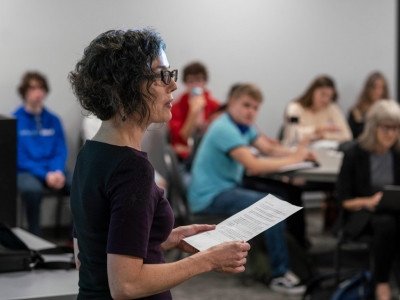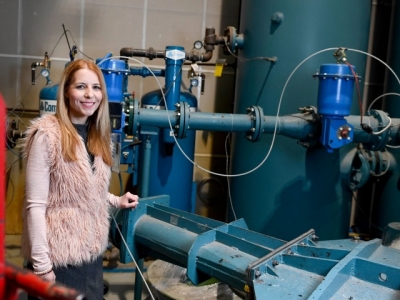By Leah Coppella
Photos by Fangliang Xu
A long time ago, Tim Pychyl used to procrastinate now and then. He can’t do that anymore. He knows way too much about the subject.
On any given day, the professor in Carleton University’s Psychology Department is quoted as an expert in publications and online articles across North America and beyond.
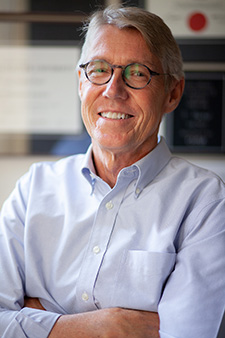
Tim Pychyl
He’s an author, winner of the prestigious 3M National Teaching Fellowship, the outgoing Director of the Centre for Initiatives in Education, and the first-ever recipient of the University Medal for Distinguished Teaching.
But understanding procrastination is his passion. While Pychyl believes everyone procrastinates to some extent, he says that it can really plague some people’s lives.
Back in 1995, when Pychyl completed his PhD at Carleton under the supervision of Brian Little, there were few publications on the subject. In fact, he had no idea that he would end up studying the subject at all. His doctoral dissertation was on how the goals that people pursue in their lives, their personal projects, affect well-being.
But while interviewing participants for his study, he realized a theme ran through each conversation.
“It was the things people said they were going to do, but weren’t doing, that really helped me understand their well-being,” Pychyl says.
“And for those people who were procrastinating, their well-being was in the toilet.”
That’s when Pychyl wanted to stop studying what people were doing and start studying what people said they were going to do . . . but never actually did.
For Pychyl, his research is also a way of teaching.
“I probably wouldn’t do any research if I didn’t have my students,” he laughs. “The main focus of my career is teaching, but research is a way of teaching in the university.”
Through collaboration with his students and colleagues, Pychyl came up with the mood repair theory of procrastination. The theory looks at emotion regulation as a critical point of how we deal with procrastination.
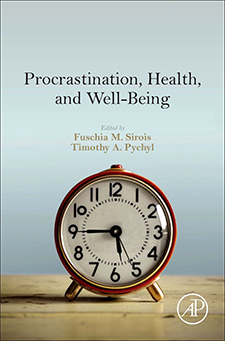
Procrastination, Health, and Well-Being
His latest book, Procrastination, Health, and Well-Being, co-edited with Carleton alumna Fuschia Sirois, now at the University of Sheffield, looks deeply at the importance of mindfulness and emotion regulation. In it, he argues that the ability to deal with negative emotions is directly related to our ability to stop procrastinating.
There are more downsides to procrastinating beyond the mere delay in getting started. In fact, Sirois found a relation between procrastination, coronary heart disease and hypertension.
“It’s not the delay that’s the problem. It’s the self-blame and the emotional disengagement that leads to internal struggles that undermine your health,” Pychyl says.
In addition, Sirois and Pychyl explain that there are the indirect effects of fewer wellness behaviours, such as the “I’ll exercise or diet later” adage, as well as more treatment delay.
Some researchers focus a lot of their attention on cognition and what we think with regard to procrastination. But Pychyl argues that this isn’t necessarily the thing we should be focusing on.
“It’s all about our feelings,” Pychyl says. “Procrastination is the misregulation of emotion. We think that by putting things off, we’re going to feel better.”
We all know that desire to reward ourselves. Maybe one more scoop of ice cream will satisfy us. Or if we buy that new outfit, we’ll be a little bit happier.
“We’re eating calories we can’t afford and spending money we can’t afford. Procrastination is wasting time we can’t afford.”
And although we can’t afford it, Pychyl admits that in the short term, it is powerfully rewarding. And that’s what makes procrastination so undeniably tempting. The present self benefits, of course, but not the future self.
“If you eat that whole row of cookies, later on you’re probably going to feel a little bit sick,” Pychyl says. “It’s also horrible for your insulin levels and your body, not to mention how it undermines any weight goals you may have.”
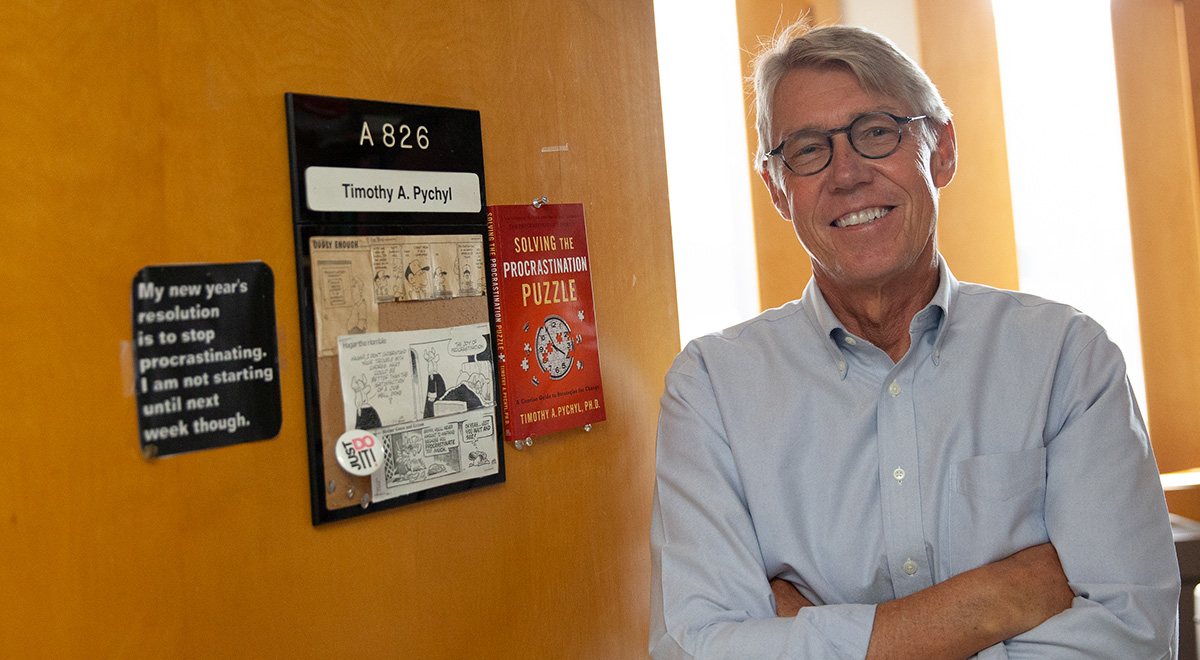
Tim Pychyl
Pychyl explains that people procrastinate as a way to cope. The coping mechanism is avoidance. By avoiding negative emotions associated with a task, such as anxiety, boredom, frustration or resentment, you can avoid experiencing them.
But what makes procrastination so harmful is that the tasks don’t actually go away. Eventually you’re left with the tasks to complete, the negative emotions again, plus the added stress of a time constraint.
“Procrastination is an emotion-regulation problem,” Pychyl says.
“It’s not a time management problem. It’s about really dealing with our feelings.”
He has some advice for the next time you tell yourself that you don’t feel like doing something.
“It’s not a matter about feeling like it, no one said you have to wait until you feel like it,” Pychyl says. “You hear people say: ‘I don’t want to do it’, but here is the whole point . . . what does wanting have to do with it?”
Pychyl says that you can’t simply supress or deny your emotions, instead you have to deal with them. His research has shown that in order to get the task done, you have to be mindful of the task at hand and be non-judgemental of your own feelings toward it. According to Pychyl, the best way to achieve this is with mindfulness.
Pychyl summarized research by Adrienne Taren, a researcher studying mindfulness at the University of Pittsburgh, who found that eight weeks of mindfulness meditation reduces amygdala volume, a part of your limbic system that many may know as the “fight or flight’’ response. Procrastination makes its home here.
But by being mindful, we can actually shrink the size of it, thus making the “amygdala hijack” of procrastination less likely.
Once you’ve nailed mindfulness, Pychyl’s go-to strategy to nix procrastinating is simple. Just get started.
“I say: what’s the next action I need to do, if I was to get started? And now what I’ve done is I’ve taken my attention off my emotions and put it on the next action.”
He suggests that this approach is similar to mindfulness meditation where you’re focusing on your breathing. When we’re able to gently and deliberately bring our attention back to the breath in meditation, we’re developing the skill to do the same with the tasks we face.
That’s how he moves from focusing on emotions to focusing on action.
One major hindrance to this is social media, something that wasn’t an issue when Pychyl started out. Pychyl says social media is so tempting because it addresses one of our basic needs. There are three major needs that must be met as humans. The first being the need for intimacy or social needs, the second, a need for competence and, third, the need for autonomy.
“The thing with social media is that it feeds our social needs, we always feel connected to people. So, our competence needs, which might be school work, they’re real, but so are our social needs,” Pychyl says. “And social media feeds that, therefore it trumps our competence needs.”
The bottomlessness of the Internet can send even the most motivated person down a YouTube spiral. A lot of us have experienced an attempt to answer a few e-mails before finding ourselves five episodes into a Netflix binge.
Pychyl argues that multi-tasking with technology is incredibly challenging, so the best way to get a task done is to just put it down to reduce temptation.
While the study of social media’s effect on procrastination is relatively new, Pychyl says that the study of procrastination itself has always fascinated his students, thanks to their shared experience of it.
“Student’s always bring something to the table,” Pychyl says. “And then together we do something bigger than they could do on their own or I could do on my own.”
Pychyl sees the future of procrastination research heading toward unpacking the neurophysiology behind it, particularly as it helps us understand emotion regulation.
He attended the 11th Biennial Procrastination Research Conference at the University of Sheffield on July 25-26 to present the most recent studies conducted by the Procrastination Research Group.
Not surprisingly, he packed early.
“No last-minute rush for this researcher.”
Thursday, January 23, 2020 in Psychology, Research
Share: Twitter, Facebook

